
-
In this Issue:
- Governor's Message
- Literature and Medicine Retreat Returns
- Advocacy Corner
- Bridge Year Graduate Physician Standing Work Group
- Dr. Smalligan Named Chapter Laureate
- Laureate Society Fellowship Program Update
- ACP Fellowship: Why?
- Share Your Prior Authorization Stories
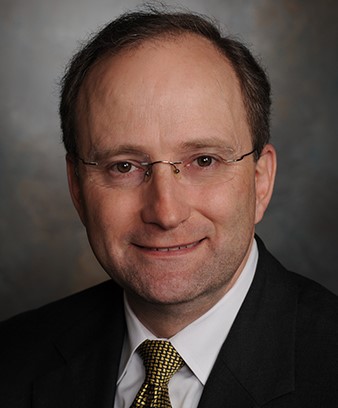
Ross B. Vaughn, MD, FACP, ACP Governor
Governor's Message
Time has gotten away from me as I have neglected to send a chapter update since the winter. I trust everyone is having a wonderful summer and hopefully has plans to take time to get away, rest, and recharge.
It was great seeing some of you at our first ever winter chapter meeting held in December on the UAB campus. Medicine in the Machine Age: The Integration and Influence of AI in Medicine featured a keynote address by Dr. Anthony Chang, a pediatric cardiologist from Orange County, California and advocate for artificial intelligence in medicine, as well as fascinating presentations by UAB's Dr. Matt Might and Dr. Rubin Pallay on generative AI in healthcare and what it may portend. An entertaining diagnostic competition between Dr. Martin Rodriquez and ChatGPT 4 kept us on the edge of our seats as we took sides rooting for man vs. machine. The chapter is grateful for the support of Dean Anupam Agarwal and the UAB Heersink School of Medicine in making the meeting possible. We hope to continue the theme of innovation in medicine going forward with winter meetings, and plans are being made for a meeting this winter at the Whiddon College of Medicine at USA.
In June, our combined Alabama-Mississippi Chapter scientific meeting was held at the Hotel Effie at Sandestin. The meeting format was completely reimagined by our program chair Dr. Allison Rogers with stimulating educational offerings for all attendees including trainees, hospitalists, and outpatient physicians. Being back at the beach was an absolute treat, and we look forward to next year's joint meeting at the Centennial Plaza Resort, May 30-June 1, 2025, in Gulfport, Mississippi.
Given recent legislation in Alabama and proposed legislation in the U.S. Congress, I have been asked by some members to comment on the chapter's position on diversity, equity, and inclusion. The Alabama chapter believes a commitment to diversity, equity, and inclusion strengthens the organization's capacity to respond to the needs of members, patients, the profession, and public. The College embraces this key strategy as well:
Diversity and inclusion improve engagement, innovation, productivity, and organizational growth while promoting new ways of thinking. A diverse, inclusive and equitable organization is characterized by mutual respect, compassion, open communication, and collaboration because it develops skills among its leadership and membership enabling effective and respectful interaction among individuals who hold a broad range of views. Such skills foster the ability to connect and build relationships, creating respect, empathy and understanding of colleagues and patients, and enables better organizational outcomes. This approach improves patient care and aligns with ACP core values. The American College of Physicians' membership comprises a diverse population of internal medicine professionals and trainees and welcomes all prospective members inclusive of diverse individual and group characteristics. Additionally, the College welcomes diversity of opinion, and respects, values and considers all opinions when formulating policy.
At the core, DEI is about being fair and respectful to our trainees, physicians, and most importantly our patients. Future trainees need to be prepared for higher education with access and social support for success in K-12 education. The Alabama School of Healthcare Sciences planned for Demopolis providing free health care education to enrolled high school students is a step down this path. Our universities and medical schools should pursue outreach to underserved communities, find ways to collaborate with K-12 education in those communities to improve educational opportunities, recruit applicants who have prospects of academic success but face obstacles in meeting admission metrics, and nurture students who need extra help to succeed. Trainees deserve fair treatment, access, and programs for advancement of their career including leadership training, mentoring, and network building. Our patients deserve access to quality care that is respectful of their culture, beliefs, and values.
If we keep our patients at the center, our moral compass will always point us in the right direction.
Ross B. Vaughn, MD, FACP
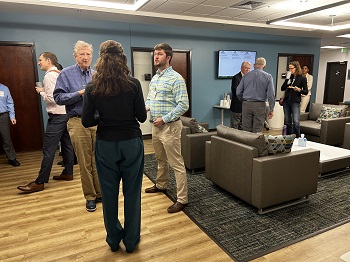
Attendees of the winter meeting gather for breakfast and conversation
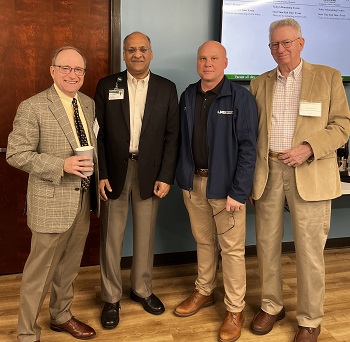
Dean Agarwal with Ross Vaughn, Craig Hoesley, and Jim Yates
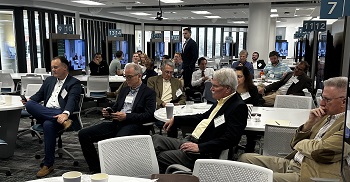
Winter meeting audience intrigued with the possibilities and pitfalls of artificial intelligence
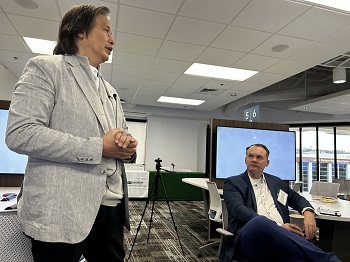
Keynote address by Dr. Anthony Chang
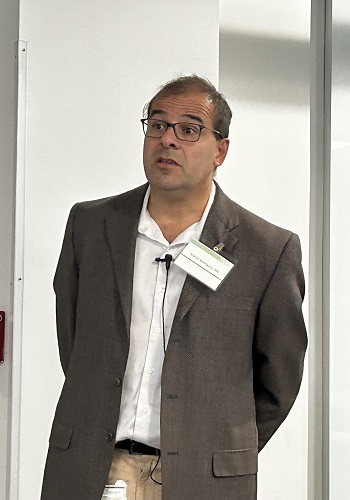
Dr. Martin Rodriguez competes with ChatGPT 4 to make a diagnosis of leptospirosis
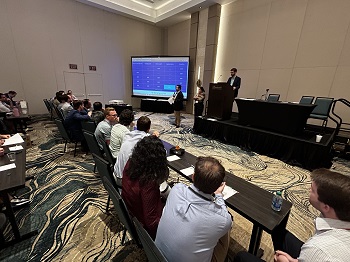
All residency programs in Alabama and Mississippi competed in Medical Jeopardy at the AL-MS Scientific Meeting
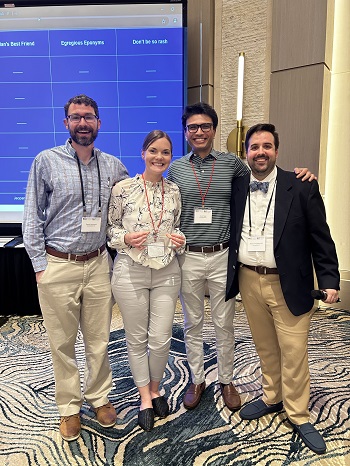
The winners, Team UAB with competition host Dr. Alonso Heudebert
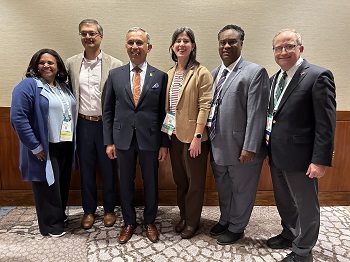
ACP President Dr. Omar Atiq attends the Alabama, Arkansas, Louisiana, Mississippi Chapter Reception at IMM 2024 in Boston
Literature and Medicine Retreat Returns
Dr. Mike Soppet
As has been the case since 1992, Alabama ACP held its "Literature and Medicine" retreat on the last weekend in January in Montgomery, Alabama. Originally conceived by Dr John Bass MD, MACP and Robert Lokey MD, FACP as a method to incorporate the humanities into everyday practice, it has become a beloved opportunity to gather with friends, many of whom have been regular attendees since the beginning. As he has done for the past 14 years, Bill Boyd MD, FACP has organized and coordinated the event. This year the venue was the Marriott Signature collection Trilogy Hotel in Montgomery. The Trilogy stands amidst Montgomery's legacy district, dedicated to the history of Civil Rights in this historic city. Many of the participants have been attending for longer than 30 years though there was one new attendee this year (me). The discussions were led by Professor Randy Davis of Jacksonville State University's department of English. Dr. Davis has been performing this function for the past 31 years and offers a wealth of knowledge and perspective. He and Dr. Boyd are instrumental in choosing the selections for discussion, which usually include a play, a volume of poetry, a novel, and a collection of short stories. The selections are distributed to registrants in November of each year which gives ample opportunity for reading and study. This year the selections were the Donald Margulies Pulitzer Prize winning play from 2000 "Dinner with Friends" (86 pages), Tolstoy's "War and Peace" (Anthony Brigg's Translation of 1600 pages), "The Selected Poems of Wendel Berry" from 1998 (178 pages), and the short story collection "Fillets of Plaice" by Gerald Durrell from 1971 (216 pages.) This year the weekend was structured to allow check-in at the hotel on Friday after work and the group met to view a DVD of the play at 7:30 pm. Beginning 8:30 am Saturday we reconvened for continental breakfast and a discussion of the play from 8:30 until 10:00 followed by the short stories until noon. We then broke for lunch and reconvened to discuss the novel on Saturday afternoon from 1:30 until 4:30. Dinner and a cash bar cocktail hour at Central restaurant across the street from the hotel began at 7:30. We again met for continental breakfast and a discussion of poetry on Sunday morning from 8:30. We completed our discussion by 11 am and the group returned home Sunday afternoon.
The format is informal with Professor Davis making some initial remarks and offering insights followed by collegial and informal discussion about various aspects of the works. The selections are not generally concentrated around a single theme but this year, the selections leant themselves to the exploration of the meanings and mysteries of friendship, marriage, family, and life living. As with all art, participants bring their own perspectives and experiences to the discussion which then becomes part of the art itself. This enriching aspect to the weekend amplified the marvelous works of literature which we discussed. The retreat is open to all members of ACP and their spouses for the nominal registration fee of $175, which entitled the participants this year to continental breakfasts Saturday and Sunday and a wonderful group dinner on Saturday night and loads of interesting discussion. Physicians who choose to attend will undoubtedly find this an enjoyable use of their free time and an opportunity to meet and bond with colleagues, new and old.
Advocacy Corner
Dr. Sujana Reddy and Dr. Edward Kim
Laureate Fellows
On March 6th, 2024, Dr. Alan Baggett, Dr. Austin Oslock, Dr. Edward Kim, and Dr. Ross Vaughn with the MASA government relations team, Niko Corley and Evans Brown, met with Alabama State Senators Lance Bell, Keith Kelley, and Gerald Allen to discuss reducing burden of prior authorizations and pushing for increase in Medicaid reimbursement. We also attended a House Health Committee hearing of HB 238 Pharmacy Benefit Manager Bill. Through this experience I learned of the far-reaching impact of advocacy throughout our development as physicians from residency through practice as well as the longitudinal commitment required to bring about those changes. When nearly half of the residents trained in Alabama are electing to leave the state, policies that create a more favorable healthcare environment and preserve healthcare quality within the state seem ever more important to better serve the local community and patients. Learning of bills like HB283, rural physician tax credit, highlighted the importance of being involved at all levels of government.
On May 15, 2024, Dr. Ross Vaughn, Dr. Austin Oslock, Dr. Sujana Reddy, Dr. Edward Kim, Dr. Michael Broadwell, Dr. Aalap Desai, and Dr. Lauren Hopkins advocated on Capitol Hill in Washington, DC for American College of Physicians (ACP) Leadership Day. These physicians played a crucial role in shaping the future of our healthcare system by directly engaging and sharing their perspectives as frontline physicians with U.S. lawmakers (including Senator Tommy Tuberville, Senator Katie Britt, and House Representatives Terri Sewell, Rep. Mike Rogers). The policies they discussed emphasized on addressing key legislation regarding healthcare challenges, including reducing administrative burdens on physicians, supporting fair physician payment, improving patient access to care, and strengthening the physician workforce by increasing the number of residency spots. The bills they asked Members of Congress to co-sponsor included the Safe Step Act of 2023, the Resident Physician Shortage Reduction Act of 2023, and the Physician Fee Schedule Update and Improvements Act. The involvement of ACP chapters and members underscores the importance of their role in the advocacy process to guide legislative decisions for the betterment of our Alabama and nation's healthcare system.
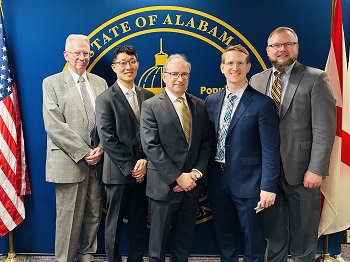
Dr. Jim Yates, Laureate Fellows, Dr. Vaughn, and ALACP Chair of Health and Public Policy Dr. Alan Baggett at the Alabama Senate
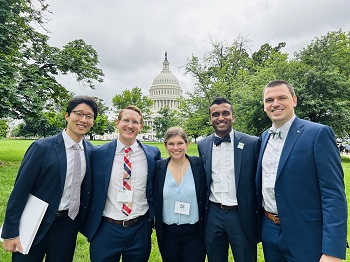
Leadership Day attendees share their patient's stories on Capitol Hill.
Bridge Year Graduate Physician Standing Work Group
The Alabama Physicians Workforce Act of 2023 creates a pathway for medical school graduates who were not successfully matched into a residency training program to practice under the on-site supervision of a fully licensed Alabama physician as they work to reapply to residency. This will provide unmatched medical graduates an invaluable opportunity to hone their clinical skills as they reapply for residency, while at the same time furthering the ability of supervising physicians to care for their patients. Permits to work will be valid for 1 year, with the possibility of a 1-year renewal if the medical graduate is not successful in matching after the first year. Permitted unmatched medical graduates will only be allowed to prescribe legend drugs.
The act establishes a diverse work group to advise and guide the Board of Medical Examiners with the development of this "apprenticeship-like" program. Former Alabama ACP Governor Dr. William Curry represents our chapter on the work group. Details of the program are being carefully vetted.
Dr. Smalligan Named Chapter Laureate
The Board of Regents authorizes chapters to honor Members, Fellows, and Masters of ACP who have demonstrated by their example and conduct an abiding commitment to excellence in medical care, education, research, or service to their community, their chapter, and ACP. Awardees have a long history of excellence and peer approval in the specialty of Internal Medicine. The first Alabama Chapter Laureate recognition awards were presented in 1988 and this tradition continues. The Laureate Awardee for 2024 is Dr. Roger Smalligan.
Dr. Smalligan received his medical degree and a Master of Public Health at the Johns Hopkins University School of Medicine and completed a Med-Peds residency at Vanderbilt. As a native of El Paso, Texas he observed firsthand during his formative years the health disparities of a poor and underserved community. He aspired to become a physician like his father and serve the poor in a developing country. After residency, Dr. Smalligan and his family worked for 9 years at a rural mission hospital in the Amazon jungle of Ecuador where he was active in administration, patient care, teaching, and research.
In 2004 he returned to the United States and joined the faculty at East Tennessee State University, eventually being named Chief of the Division of General Internal Medicine. In Tennessee he served on the state ACP Chapter leadership council and took the lead in organizing a successful annual meeting for the chapter.
In 2009, Dr. Smalligan assumed the role of Regional Chair of Internal Medicine at Texas Tech University Health Sciences Center in Amarillo where he developed an innovative smoking cessation program that was eventually funded through the 1115 Waiver Program in Texas for $2 million. He served as the public health authority for Potter and Randall Counties in Texas leading the care of refugees, the research and treatment of patients involved in an outbreak of TB, the public scare around Ebola, and a local, CDC-aided investigation of a series of botulism cases. His ACP involvement continued in Texas where he served several years as the Northern Director for the Texas ACP Chapter.
In 2017, Dr. Smalligan joined the UAB Huntsville Regional Medical Campus as Regional Dean. He immediately became involved with our chapter as a council member. At the Huntsville campus, he encourages and sponsors ACP membership of all the internal medicine faculty and residents. On the invitation of the ACP Global Engagement group, Dr. Smalligan traveled as part of a team to give faculty development lectures in Argentina in 2018 and Paraguay in 2019. In 2020, he was asked to represent ACP and give lectures at the annual meeting of internal medicine physicians in Peru.
More recently, Dr. Smalligan has worked to build relationships in the medical and wider Huntsville community as well as recruit new faculty, grow the clinical departments, and teach medical students and residents. A priority has been active recruitment of strong students from HBCUs to increase the number of students from groups underrepresented in medicine. Clinically he remains active by rounding and leading morning report with students and residents at the hospital.
He enjoys spending time with his wife and has an active lifestyle running, hiking, and playing tennis while finding time for cultural events and an active church life.
The Alabama Chapter of the American College of Physicians is proud to bestow the 2024 Laureate Award to Dr. Roger Smalligan.
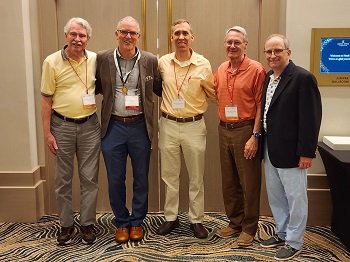
Laureate Dr. Pink Folmar, Laureate Awardee Dr. Roger Smalligan, and Laureates Dr. T.J. Hundley, Dr. Mike Soppet, and Dr. Ross Vaughn
Laureate Society Fellowship Program Update
In an effort to actively and deliberately develop a pipeline of leaders for sponsorship to state and national ACP leadership positions, the Alabama ACP developed the Laureate Society Fellowship in 2023.
Rather than relying on future leaders to "self-select" and step forward, the goal of the Alabama Laureate Society Fellowship is to actively and deliberately develop a pipeline of leaders for sponsorship to state and national ACP leadership positions. Second or third-year residents with leadership qualities and potential are nominated by their program directors from across the state. Nominees should be ACP members, aspire to leadership in Alabama ACP and national ACP, and be committed to remaining and practicing in Alabama. Two recipients will be selected by members of our Laureate Society (former state Laureate Awardees) for a two-year Laureate Fellowship Award. The award covers the costs of attending up to 2 state ACP meetings, 2 national ACP meetings (including pre-meeting workshop and clinical skills courses), 2 state Leadership Days in Montgomery, and 2 ACP Leadership Days in Washington, DC. The recipients are members of the state ACP meeting planning committee, the state ACP resident council, the Governor's Advisory Council and have access to mentorship by members of the Alabama ACP Laureate Society. The fellowship is intended to provide a framework for introduction and networking with state and national ACP leadership.
This year we welcomed our second class of Laureate Fellows, Aashka Patel, MD of Brookwood Baptist and Edward Kim, MD, MPH of East Alabama Medical Center, who join Sujana Reddy, MD and Austin Oslock, MD, MPH.
The Laureate Society Fellowship Program received a Chapter Development Grant Award for the second year from ACP and received our chapter's first national John Tooker Evergreen Award. The John Tooker Evergreen Awards Program provides recognition and visibility to chapters that have successfully implemented programs to increase membership and member engagement, improve communication and chapter management, enhance diversity, and foster careers in internal medicine.
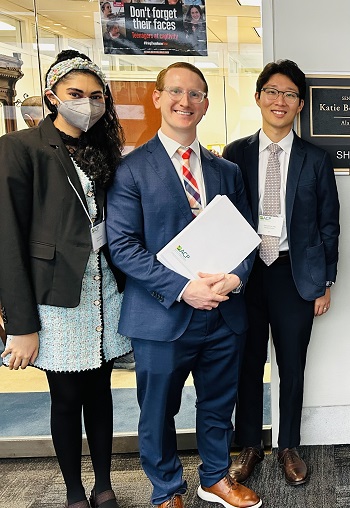
Laureate Fellows Sujana Reddy, Austin Oslock and Eddie Kim visit the office of U.S. Senator Katie Britt
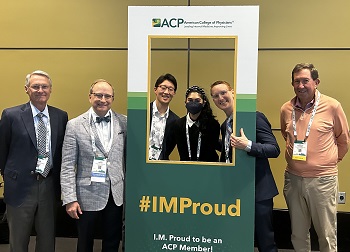
Chapter Laureates and Laureate Fellows at IMM 2024 in Boston
ACP Fellowship: Why?
Fellowship in the ACP is a peer-reviewed credential that serves as a public reflection of excellence in internal medicine and signifies an ongoing dedication to the profession, the patients we care for, and the communities we serve.
By becoming a fellow, you join a distinguished community of internal medicine physicians from a variety of different career paths and practice settings. It increases your professional credibility and adds value to your CV, your promotions package, and opens doors to new career development opportunities. FACPs are eligible for chapter and national leadership positions in the ACP.
Core requirements for ACP fellowship include initial board certification in internal medicine or neurology, ACP member in practice or a subspecialty fellowship for at least 3 years since the completion of residency, dues must be paid for at least 3 of the last 4 years and must be current, professional activity in internal medicine, neurology, or a subspecialty of internal medicine, participation in at least three of the four pillars of fellowship, and an active medical license.
A 3-year directed fellowship pathway is also available to new residency graduates.
Applications must include the following before review for consideration: completed application, sponsoring letter or form from a current MACP or FACP, updated CV, and $175 Fellowship initiation fee.
There are two ways to apply:
- Apply electronically at https://www.acponline.org/facp, auto-populates with your contact information, training information, and ACP CME activities, upload your CV, upload your sponsor letter
- Use paper application form and mail to ACP, include copy of your CV, include your sponsor letter.
Elections are held 5 times each year in July, September, November, January, and March. The peer review process takes approximately 8-10 weeks. Some applications may require review at a Credentials Committee meeting, which are held twice each year in May and November.
Share Your Prior Authorization Stories
With the ACP priority of patients before paperwork in mind, our chapter has partnered with the Medical Association of the State of Alabama to push for legislation that would curb prior authorization abuse.
Please visit this website and share your preauthorization horror stories. MASA is particularly interested in PA's that are almost always approved and therefore a complete waste of physician's time to submit, PA's for routine and inexpensive medications, and examples of how much time physicians spend on such non-clinical task that takes you away from patient care.

